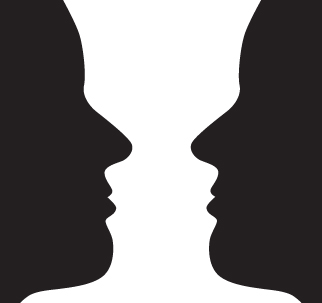For some reason, while I was out for my run today, I had one of those brilliant flashes of insight that end up sounding kind of lame when approached from a more rational direction.
Here’s the insight: Writers don’t write stories.
See what I mean? But let me explain.
When I sit down and write, I have something that happens in my head. I translate this into words. I hope that someone will eventually read it, so I send it out into the world in some form or other. They read it. Something happens in their heads.
Where is the story? On the page or in my/the readers’ heads?
Words are nonsense. That whole “A rose is a rose is a rose” thing by Gertrude Stein is an exercise in nonsense. (For example – say the word “pizza” fifty times. Chances are you’ll have a second or two where the word doesn’t mean anything, it’s just a couple of syllables.)
Words are nonsense out of which our brains make sense, whether there’s any sense there or not.
`Twas brillig, and the slithy toves
Did gyre and gimble in the wabe:
All mimsy were the borogoves,
And the mome raths outgrabe.
Is that sense or nonsense? Lewis Carroll meant something (if you look it up in Annotated Alice you’ll see what), but he didn’t bother to explain it to his readers, although I suspect he might have, to Alice. But even if you don’t know what the words “mean,” you still try to make meaning out of it, the same way you make shapes out of clouds.
The picture above – is it a face or a vase?
Neither; it’s an optical illusion. Our brains fill in meaning, but it’s essentially a Rorschach blob. The picture happens inside our heads – the creator’s and the viewers’.
Same thing with words.*
Writers don’t write stories; we imagine them. Then we create the illusion of a story with words (pictures, etc.). If we’re good, we get the readers to imagine very nearly the same story that we imagined.
It’s why some people write every single freaking detail and still can’t write worth a damn. You can write a photograph, but what the reader “sees” is an Impressionistic painting, or even modern art – even in classic books. People tend to skim description.
It’s why some people write exactly what happened in their imagination, and the stories suck. They’re not creating the illusion; they’re recording.
It’s why the writer doesn’t work in a vacuum; good readers are essential. Not just nice. Bad readers = sucky story. (Get a five-year-old to read your intellectual thriller and you’ll see what I mean.)
It’s why a writer doesn’t have to be perfect in order to sell a million books; the story comes from the readers, not the words. The words are an illusion that we often forgive, when we really want that story in our brains.
It’s why there better be some damned description at the beginning (I kick myself on this), because there is no illusion.
So. I write stuff. People are going to call what I write stories. But the words aren’t the story; they’re just an illusion. If you’re good, that illusion sparks the story in the reader. But the words aren’t worth crap without that other imagination to make it fly.
*And movies. Nothing actually moves.



All of my stories are things I see in my head during the day or in dreams when I sleep. The best we can do is transcribe, and while doing so, try to make the story happen. At least, that’s how I look at it.